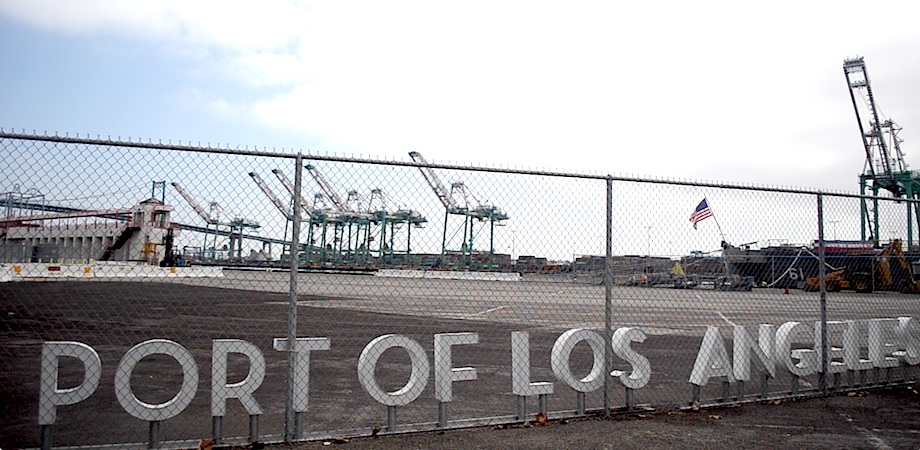Port Tech Los Angeles is one local company kept in business by the shipping industry. In this video, Port Tech's Director of Client Services explains the importance of harbor management.
Hollywood is another one of Los Angeles' important economic centers. Click here to read about the latest changes in the entertainment industry.
By Graham Clark
There’s a university course on shipping policy in Paris that begins with the same question every year. The professor, Olaf Merk, asks his students, “If you were Mayor of a port city, what would you do?”
He’s dedicated his 30-some years of life to the subject. Research, Merk has found, indicates that port cities are massively crucial in keeping national and global industries afloat. They provide legions with jobs, yet disproportionately expose local residents to the negative elements of big shipping. And yet, he asks this question because he doesn’t know the right answer. He has no clear, conclusive take as to what modern mayors should to do to run ports well.
Merk’s not alone, and he has some allies in cluelessness much closer to home. In the race to be L.A.’s next Mayor, neither of the final candidates have proposed specific plans regarding the Port of Los Angeles’ development, though both have noted its monstrous import as an economic issue. Whoever wins the election will determine the future of America’s biggest import and export hub, but no one’s talking about what that entails.
The subject has not been absent from election discussions entirely. Both Wendy Greuel and Eric Garcetti have reached out to garner supporters from the port. Greuel has netted an endorsement from the Los Angeles County Federation of Labor, which represents dockworkers and others directly tied to the port. Garcetti has been a visible presence in the port as well, hitching his campaign publicly to the region’s leading candidate for City Council, Joe Busciano and netting an endorsement from a smaller labor camp in the International Longshore & Warehouse Union Local 13.
Both mayoral candidates have pledged to focus on the port if elected, and support discussions or investments as needed. That’s likely to mean millions in infrastructure improvements in the next six years, according to Phillip Sanfield, Director of Media Relations for the Port. Sanfield says in the next few years, construction projects will flood the ports with funds, as the city installs modern tech including advancements in freight shipping by rail.
Sanfield is quick to point out, when describing the payoff from these investments, that the port’s role as an economic engine isn’t merely providing jobs to longshoremen, boat pilots and similar traditional shipping-industry jobs. Particularly in the Port of Los Angeles, public funds have gone towards supporting alternative harbor-based jobs, such as research on shipping methods and green tech development.
One such company based out of the port is Port Tech Los Angeles. They work to foster local entrepreneurs who have ideas for making ports more scientifically productive, and friendlier to the towns and cities they occupy. They’re one group with a vested interest in following political developments related to the shipping center, and they’re not exactly pleased with the story so far.
“It isn’t clear that there’s a real candidate that says they’re really championing the particular issues of the port,” said Ann Lee Carpenter, Port Tech Los Angeles’ Director of Marketing.
Though the discussion on port issues has been ephemeral between Greuel and Garcetti (both campaigners declined to comment on this story) that doesn’t mean it’s not a critical time to talk about the harbor hub. Across the world, the study of shipping practices is an industrial issue of as great import as ever. One of the biggest organizations involved in this field is the International Association of Ports and Harbors, which held a convention in downtown L.A. on May 6. Delegates there discussed the advantages of numerous new techniques for building business out of shipping centers.
Patrick Verhoeven, Secretary General European Sea Ports Organization, used the conference as a platform to advocate for further privatization of prominent ports, which he said has been the trend for successful global ports in the last half decade. Harbors in Europe, including Hamburg, have advanced with minimal involvement from government officials. If such privatization were to be introduced in the Port of L.A., and the harbor began operating predominantly as an independent revenue engine, it’s unclear what the resulting impact would be.
Above: Eric Garcetti has aligned his campaign closely with San Pedro's City Council Representative Joe Busciano. That includes his appearance at a skateboarding event sponsored by Busciano.
Above: View footage from the International Association Of Ports And Harbors 2013 Conference.
Above: An interactive guide to the 25 biggest ports on earth.
Under the city’s current political structure, the way the mayor determines the future of the port is by selecting the Los Angeles Harbor Commission. This panel of six officials have backgrounds in economics, social work, and hand-on longshoreman work. They have the final say when it comes to port policy, meaning they decide how capital is generated and allotted, from rates on particular forms of shipping to the ways that revenue is spent. The Commission stated charter includes hearing arguments from all types of groups with something at stake in the harbor’s future. They’ve determined and will manage the ongoing process of responding to global industry developments, currently including international competition in Central and South America. The commission determines how infrastructure improvements will be wrought by the millions in allotted public funds, a process all the more important as automated harbor terminals become the norm and chip away at the local economic benefits of having a harbor in-town.
“Every mayor has the opportunity to appoint all the commission members to the port commission,” said Tim McCosker, who lives and works near the port in San Pedro. “So the next mayor will make the appointments he or she wants to make.”
Despite the fact that no new officials have been appointed, the Harbor Commission has already made changes to pave the way for their new leadership. One of the first such actions they took was disbanding the Coastal San Pedro Neighborhood Council, which was put in place to give concerned residents an outlet a formal political voice. The group was dissolved by unanimous Commission vote on May 2, without establishing or naming any apparatus intended to serve the same function.
“I do not respect this process,” said June Burlingame-Smith, President of the now-defunct Neighborhood Council. “I’ve made this point to both Wendy and Eric,” Burlingame-Smith said, “They’ve both committed to putting more local people on the commission, which will help. I’ll work with whoever gets elected Mayor, of course.”
Her main concern is that any and all changes be made publically, something she says is not currently being done.
“It should be open, so people know about things like this,” she said, referencing the Harbor Commission meeting that saw the disbandment of her organization. “No one knew about this.”
With no specifics regarding either candidate’s picks for the Commission, there’s also no one who knows what the port’s future will hold. Even though the Harbor Commission says they’ll play nice with whoever gets elected in these dramatic times for globalized shipping, with so much at stake it’s hard to imagine nothing but smooth sailing for the port when a new Mayoral regime takes office this month.



